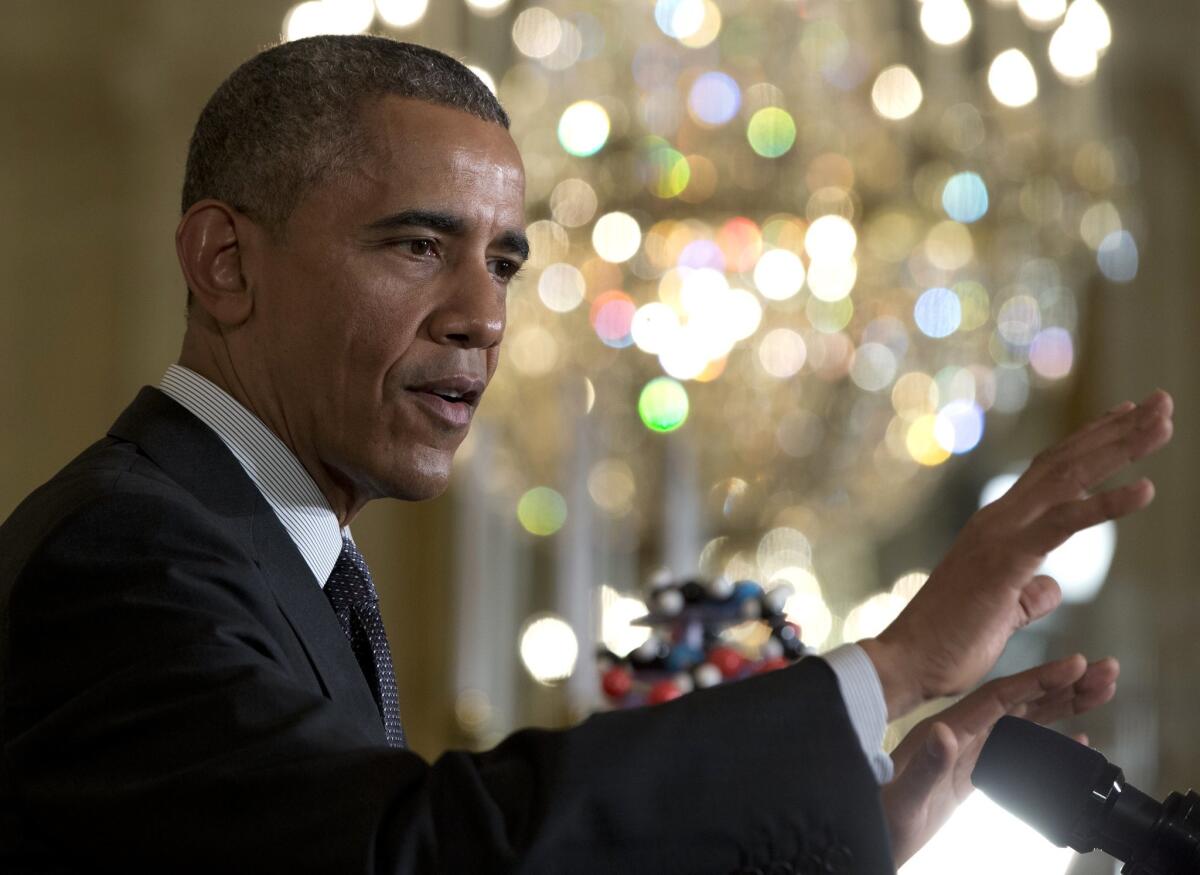Opinion: President Obama’s budget: More taxes, more spending, same message

- Share via
President Obama is scheduled to release his latest annual budget proposal Monday, and critics -- OK, Republicans -- are already complaining that Obama wants to spend too much and tax too much.
But just as much of the $4-trillion budget is on autopilot, so is the debate over it. The thing to keep in mind is the big picture it outlines, not the list of wishes that won’t be granted.
At the heart of the issue is the split between Obama and congressional Republicans over total spending. The president is proposing a dramatic reduction in the automatic cuts that the Budget Control Act of 2011 would impose; those cuts stem from the failure of lawmakers and the administration to reach a deficit-cutting deal that year.
All of Obama’s budget proposals have sought to ease these “sequester” cuts, with the extra spending being offset by higher taxes on high-income Americans. So it should come as no surprise when Obama’s budget for fiscal 2016 calls for restoring $74 billion of the $91 billion slated to be cut, and to pay for it at least in part through higher taxes.
(OK, “cutting” in Washington doesn’t mean the same thing as “cutting” in your personal budget. Even if the full sequester went into effect, federal discretionary spending would inch up ever so slightly. But it wouldn’t go up nearly enough to keep every program and service intact, because inflation and population growth drive their costs up relentlessly. That’s why, from the perspective of a federal budget wonk, higher spending allocations that don’t keep up the growth in costs are considered “cuts.”)
Nor should it surprise anyone when Congress adopts a budget that doesn’t spend as much as Obama has proposed. That too has been the pattern since Republicans took control of the House in 2011. With Republicans also holding the majority in the Senate, the discretionary budget will be completely in the hands of the GOP. Remember, the annual budget resolution doesn’t require the president’s signature, so Obama can’t veto it.
Yet as much as the sequester cuts may appeal to deficit hawks in theory, many Republicans don’t like them in practice. After the partial government shutdown in October 2013, Republicans accepted a budget deal that blocked much of the sequester cuts until fiscal 2016. The deal spared the Pentagon of cuts that many members of the GOP vigorously opposed.
A new round of cuts is slated for October, and it’s not possible to spare the Defense and Homeland Security departments without imposing devastating reductions on some non-defense agencies that Republicans support. So although Obama won’t get as much as he seeks overall, lawmakers will almost certainly agree to spend more than the sequester would allow.
Although he’s calling for more spending, Obama is also expected to offset the extra spending with higher revenues. In that sense, his plan isn’t likely to worsen the budget deficit. Nor is it likely to make it significantly better; Obama has never included in his budgets the kind of entitlement reforms needed to solve the government’s long-term fiscal problems.
Having said that, there’s virtually no chance Congress will adopt the tax increases Obama is expected to propose to cover much of the cost of his spending initiatives. The blowback from lawmakers was so severe that Obama has already abandoned one of them -- his proposal to end the tax break for college savings plans, most of whose benefits redound to households with incomes above $200,000 a year. If the problem with the tax break was that too much of its benefit went to high-income people, it would have been better just to make high-income people ineligible for it, rather than canceling it for everyone.
Even when Obama and congressional Republicans are focused on the same topic, such as corporate overseas profits, they take different tacks. Both sides have floated the idea of reducing the corporate tax on foreign profits, which becomes due when they are repatriated. Not only does the United States have the world’s highest corporate tax rate (35%), it’s one of the only countries to tax profits earned outside its borders. But though Republicans have talked about eliminating the tax on repatriated earnings or waiving it for a year, Obama wants to impose a temporary 14% tax on overseas profits even if the money stays overseas.
Chances are good that Republicans will try to lower some tax rates, given the advantage of a new House rule that calls for “dynamic” scoring -- a change in the way future deficits are estimated that favors tax cuts. Such a move would tee up a debate between Republicans “pro-growth” tax policies and Democrats’ focus on income inequality.
Which leads us back to Obama’s budget. As much as the document is about specific spending and tax proposals, it’s also delivers a message to voters about the role of government. And the president’s message on taxes, as it has been throughout his administration, will be that multinational corporations and high-income households need to pay more to fund programs (or “investments,” as Obama likes to call them) that provide the foundation for a strong economy and upward mobility for the disadvantaged.
OK, lawmakers have heard that one before. Yet the improving economy may give Obama’s message more currency now than it has had in his previous six years in office. As immune as congressional Republicans may be to his words by now, lawmakers aren’t the only audience Obama is trying to reach with a budget that, once again, spends more and taxes more.
Follow Healey’s intermittent Twitter feed: @jcahealey
More to Read
A cure for the common opinion
Get thought-provoking perspectives with our weekly newsletter.
You may occasionally receive promotional content from the Los Angeles Times.







